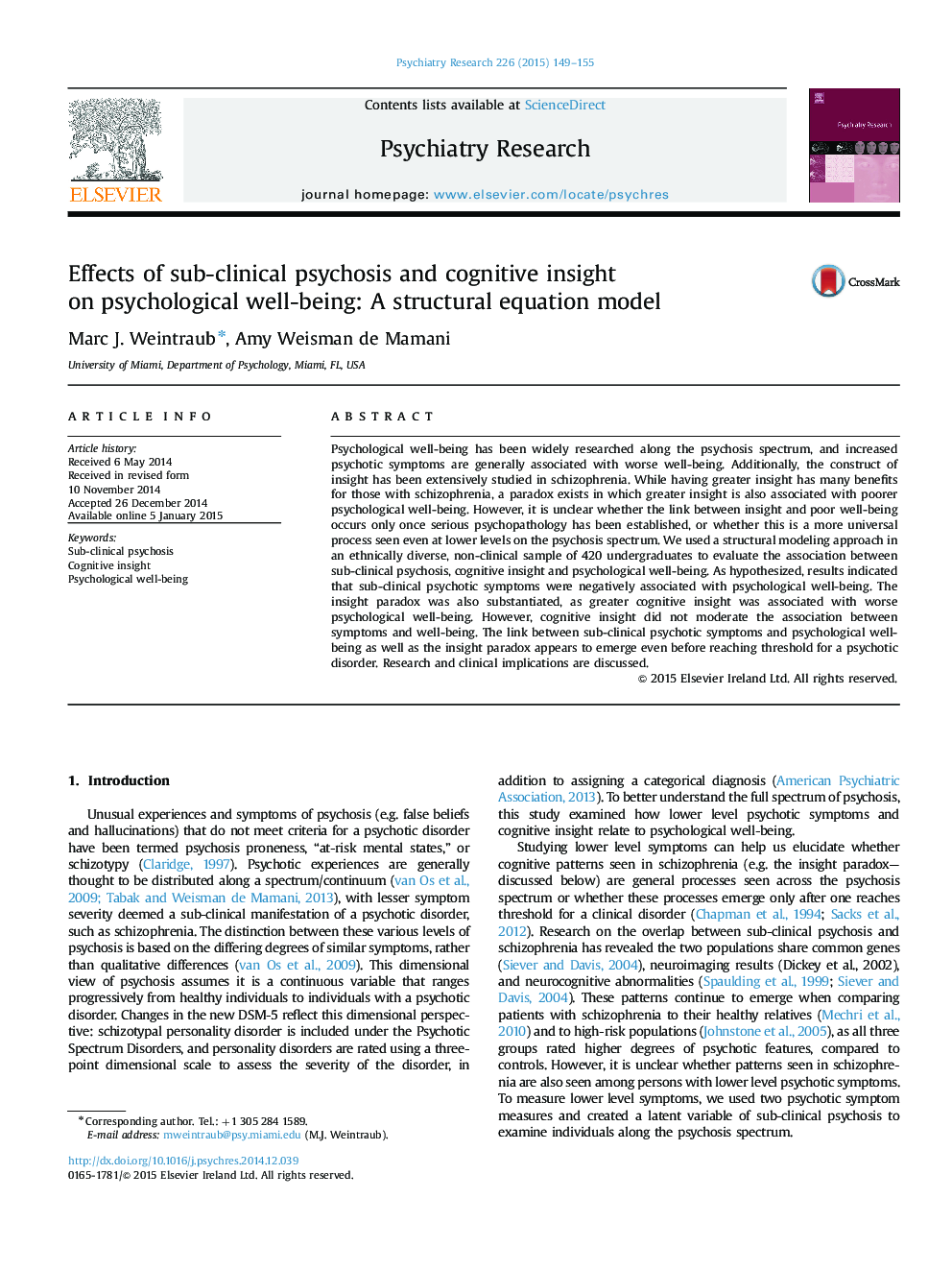| کد مقاله | کد نشریه | سال انتشار | مقاله انگلیسی | نسخه تمام متن |
|---|---|---|---|---|
| 10303786 | 545625 | 2015 | 7 صفحه PDF | دانلود رایگان |
عنوان انگلیسی مقاله ISI
Effects of sub-clinical psychosis and cognitive insight on psychological well-being: A structural equation model
ترجمه فارسی عنوان
اثرات روانشناسی بالینی و بینش شناختی بر سلامت روانی: یک مدل معادلات ساختاری
دانلود مقاله + سفارش ترجمه
دانلود مقاله ISI انگلیسی
رایگان برای ایرانیان
کلمات کلیدی
روانپریشی بالینی، بینش شناختی، سلامت روانی،
ترجمه چکیده
رفاه روانی در طول طیف روان شناختی به طور گسترده مورد مطالعه قرار گرفته است و نشانه های روان پریشی افزایش یافته است که به طور کلی با رفاه بدتر مرتبط است. علاوه بر این، سازه بینش در اسکیزوفرنی گسترده مورد مطالعه قرار گرفته است. در حالی که داشتن بینش بیشتر مزایای بسیاری برای افرادی که مبتلا به اسکیزوفرنیا هستند، وجود دارد، پارادوکس وجود دارد که در آن بینش بیشتر با رفاه روانشناختی فقیرتر نیز همراه است. با این حال، مشخص نیست که آیا ارتباط میان بینش و رفاه عمومی تنها زمانی اتفاق می افتد که یک روانپزشکی جدی ایجاد شود یا اینکه این یک فرایند جهانی تر است که حتی در سطوح پایین تر از طیف روانشناسی دیده می شود. ما از یک رویکرد مدل سازی ساختاری در یک نمونه ی متفاوت از 420 نفر از دانشجویان غالب بالینی استفاده کردیم تا رابطه بین روان شناختی بالینی و بینش شناختی و سلامت روانی را بررسی کنیم. به عنوان فرضیه، نتایج نشان داد که علائم روان پریشی بالینی با سلامت روانی منفی ارتباط دارد. پارادوکس بینش نیز اثبات شد، زیرا بینش شناختی بیشتر با رفاه روانی بدتر مرتبط بود. با این حال، بینش شناختی ارتباط بین علائم و رفاه را کاهش نمی دهد. ارتباط بین علائم روان پریشی بالینی و رفاه روانشناختی و همچنین پارادوکس بینش ظاهرا حتی قبل از رسیدن به آستانه برای یک اختلال روانگردان ظاهر می شود. تحقیقات و مفاهیم بالینی مورد بحث قرار گرفته است.
موضوعات مرتبط
علوم زیستی و بیوفناوری
علم عصب شناسی
روانپزشکی بیولوژیکی
چکیده انگلیسی
Psychological well-being has been widely researched along the psychosis spectrum, and increased psychotic symptoms are generally associated with worse well-being. Additionally, the construct of insight has been extensively studied in schizophrenia. While having greater insight has many benefits for those with schizophrenia, a paradox exists in which greater insight is also associated with poorer psychological well-being. However, it is unclear whether the link between insight and poor well-being occurs only once serious psychopathology has been established, or whether this is a more universal process seen even at lower levels on the psychosis spectrum. We used a structural modeling approach in an ethnically diverse, non-clinical sample of 420 undergraduates to evaluate the association between sub-clinical psychosis, cognitive insight and psychological well-being. As hypothesized, results indicated that sub-clinical psychotic symptoms were negatively associated with psychological well-being. The insight paradox was also substantiated, as greater cognitive insight was associated with worse psychological well-being. However, cognitive insight did not moderate the association between symptoms and well-being. The link between sub-clinical psychotic symptoms and psychological well-being as well as the insight paradox appears to emerge even before reaching threshold for a psychotic disorder. Research and clinical implications are discussed.
ناشر
Database: Elsevier - ScienceDirect (ساینس دایرکت)
Journal: Psychiatry Research - Volume 226, Issue 1, 30 March 2015, Pages 149-155
Journal: Psychiatry Research - Volume 226, Issue 1, 30 March 2015, Pages 149-155
نویسندگان
Marc J. Weintraub, Amy Weisman de Mamani,
